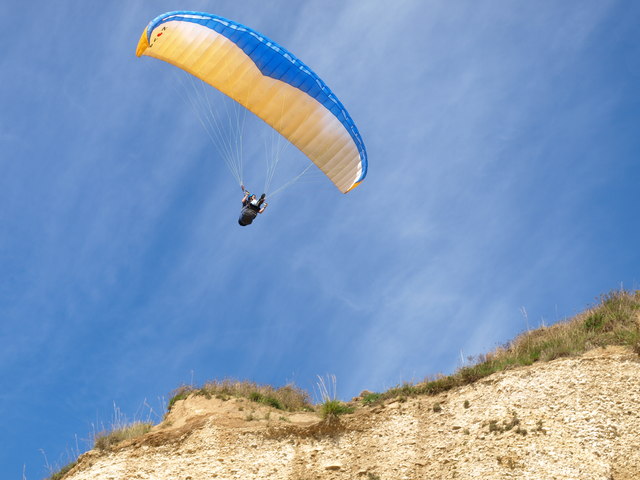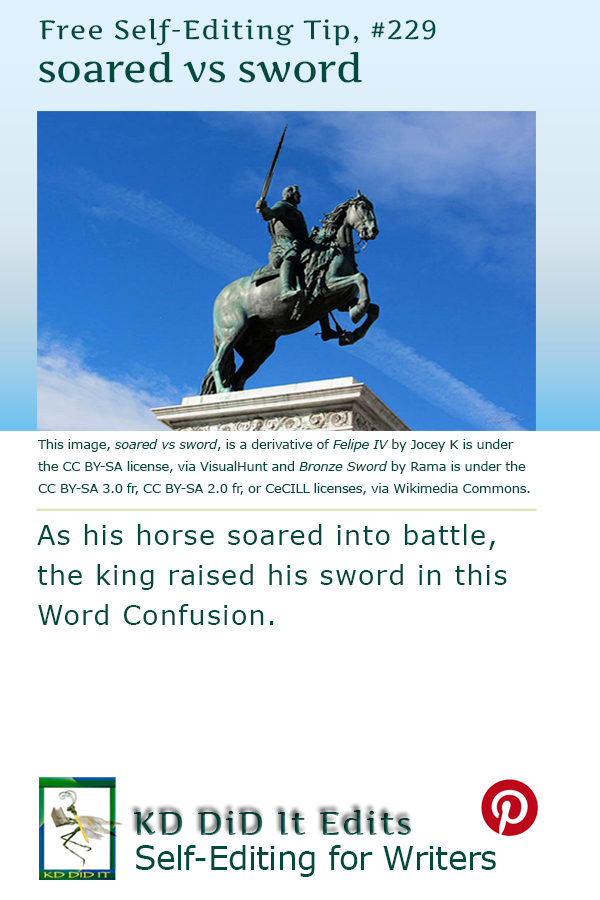Revised as of
1 Jan 2023
Up soared the sword, and then it came crashing down, slicing from right to left as it cleaved the beast in two.
Okay, so it’s a violent sort of image. As least it’s more accurate than he pulled his soared from his scabbard and slashed right and left. I have no idea how one slashes with a past tense verb. This sounds quite insubstantial, and I’ll bet anything that he died very quickly.
And naturally, since most confusions swing this way, soared and sword are a pair of heterographs.
Word Confusions . . .
. . . started as my way of dealing with a professional frustration with properly spelled words that were out of context in manuscripts I was editing as well as books I was reviewing. It evolved into a sharing of information with y’all. I’m hoping you’ll share with us words that have been a bête noire for you from either end.
If you found this post on “Soared versus Sword” interesting, consider subscribing to KD Did It, if you’d like to track this post for future updates.
| Soared | Sword |
|---|---|

Soaring Above © Andy Beecroft and licensed for reuse under the CC SA 2.0 license, via Geograph.org.uk. — A paraglider soared high above us. |

Épée de charlemagne is Chatsam’s own work under the CC BY-SA 3.0 license, via Wikimedia Commons. — The sword utilized by Charlemagne. |
| Part of Grammar: | |
| Morpheme: soar
Noun; Verb, intransitive Plural for the noun: soar Third person present verb: soars |
Noun
Plural: swords |
| Noun: The act of gliding while maintaining altitude, especially the sport of flying a heavier-than-air craft by using ascending currents of air The height attained in gliding Verb, intransitive:
|
A weapon with a long metal blade and a hilt with a hand guard, used for thrusting or striking and now typically worn as part of ceremonial dress
A cause of death or destruction [Military; initial capital letter, Sword] The code name for one of the five D-Day invasion beaches on France’s Normandy coast, assaulted by British forces [Swords] One of the suits in a tarot pack |
| Examples: | |
| Noun: “Banks, who has spent nearly three decades as an educator, has a book on education reform coming out in September entitled Soar” (Banks). The River Soar is a major tributary of the River Trent in the English East Midlands and is the principal river of Leicestershire. Verb, intransitive: When she heard his voice, her spirits soared. The gulls soared on the summery winds. The cost of living soared. As the economy continued to stagnate, the crime rate soared. Interest in politics has soared in the general public, as Trump continues to pontificate. |
Not as many perish by the sword these days.
It is past time to beat swords into ploughshares. He who lives by the sword dies by the sword. The whole village was put to the sword. Kate Daniels (in Ilona Andrews’ series of the same name) owns Slayer, a powerful, magical sword. The phrase “the sword of Damocles” is a metaphor for a precarious position. The pen is mightier than the sword. Representing the element of Air, the suit of Swords in a tarot deck is associated with action, power, ambition, and courage among others. Swords is considered to be the most powerful and dangerous of the suits in a tarot deck. |
| Derivatives: | |
| Adjective: soaraway, soaring Adverb: soaringly Noun: soarer |
Adjective: swordless, swordlike Noun: sword-bearer, swordplay, swordsman, swordsmanship |
| History of the Word: | |
| Late Middle English, as a shortening of the Old French essorer, which is based on the Latin ex- (out of) + aura (breeze). | Old English sw(e)ord is of Germanic origin and related to the Dutch zwaard and German Schwert. |
C’mon, get it out of your system, bitch, whine, moan . . . which words are your pet peeves? Also, please note that I try to be as accurate as I can, but mistakes happen or I miss something. Email me if you find errors, so I can fix them . . . and we’ll all benefit!
Satisfy your curiosity about other Word Confusions on its homepage or more generally explore the index of self-editing posts. You may also want to explore Book Layout & Formatting Ideas, Formatting Tips, Grammar Explanations, Linguistics, Publishing Tips, the Properly Punctuated, Writing Ideas and Resources, and Working Your Website.
Resources for Soared versus Sword
Apple Dictionary.com
Banks, David C. “Why Middle School Should Be Abolished.” The Daily Beast. 12 July 2014. Web. n.d. <https://www.thedailybeast.com/why-middle-school-should-be-abolished?source=dictionary>.
Pinterest Photo Credits:
Felipe IV, <https://visualhunt.com/f2/photo/14684358144/6c2b07c6bf/>, by Jocey K, <https://visualhunt.com/author/557a0f>, is under the CC BY-SA license, via VisualHunt and Bronze Sword by Rama is under the CC BY-SA 3.0 fr license, via Wikimedia Commons.


